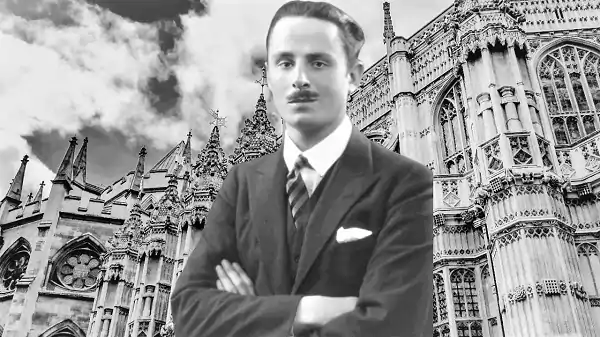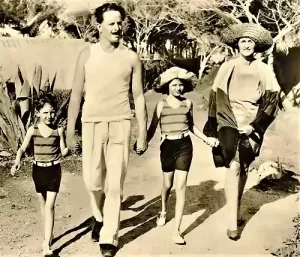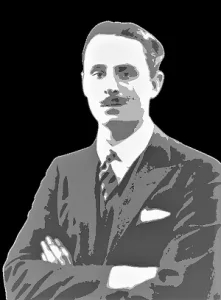
Oswald Mosley (Born on 16 November 1896 – Died on 3 December 1980) was a British politician and best known as the founder of the British Union of Fascists in 1932. Oswald Mosley was handsome, charismatic, known for setting crowds the light with his passionate speeches and aristocrats.
With a huge working-class following, he was perhaps the only politician able to unite voters of both major parties. Regularly tipped as a future Prime minister, it was said that he could one day be Britain’s greatest leader.
But that never happened instead, Mosley chose to take his career down a much more dangerous path. The path marked fascism. As Britain’s leading fascist, Mosley was able to command armies of black shirts. He received funding from Benito Mussolini, was friends with Adolf Hitler.
Had the Nazis conquered Britain, he would have almost certainly been made the ruler of a fascist UK state.
Facts About Oswald Mosley
- Born: 16 November 1896, Mayfair, London, United Kingdom
- Full Name: Oswald Ernald Mosley
- Known For: Founder of the British Union of Fascists
- Oswald Mosley Height: 6 Feet 2 Inches or (1.88 meters)
- Political party:-
Conservative Party (1918–1922)
Independent (1922–1924)
Labour Party (1924–1931)
New Party (1931–1932)
British Union of Fascists (1932–1940)
Union Movement (1948–1973) - Nationality: British
- Wife:-
Diana Mitford (m. 1936–1980)
Lady Cynthia Mosley (m. 1920–1933) - Death: 3 December 1980, Orsay, Essonne, France
- Cause of Death: Parkinson’s disease
- Quotes: “Say ‘boo’ to a liberal, and free speech is on the run.” ― Oswald Mosley
Oswald Mosley Biography
Sir Oswald Mosley was born on November 16, 1896, into an aristocratic family. He was the elder son of Oswald Mosley, 5th baronet, and Katharine Maud Edwards-Heathcote. After his parents separated, Oswald was raised by his mother and paternal grandfather, Sir Oswald Mosley, 4th Baronet.
He was educated at West Downs School, Winchester College, and at the Royal Military Academy in Sandhurst. During World War I, he fought with the 16th Lancers on the Western Front.
He later worked as an observer in the Royal Flying Corps, where he sustained a permanent leg injury in a plane crash. Before the injury had healed, he returned to the trenches and passed out from pain during the Battle of Loos in 1915.
He was assigned to do administrative work and in 1916, when his injury did not heal, he was dismissed as an invalid. He spent the remainder of the war in the offices of the Munitions and Foreign Ministries.
Member of Parliament

When the war was over he began to deal with politics and in 1918 he was elected deputy in the House of Commons from the ranks of the Conservative Party, becoming the youngest member of Parliament in English history.
In 1920, he married Cynthia Curzon, daughter of the Viceroy of India George Curzon who would help him make his way through the British political arena. In 1921, disapproving of the conservatives’ behavior towards the Irish question, Mosley abandoned the Tories to side with the opposition, while remaining an independent.
Between 1922 and 1923, without being formally endorsed by any party, he confirmed his parliamentary seat, and in 1924 he joined the Labor Party and, through thick and thin, remained affiliated with the party (sometimes as an “official” candidate, sometimes as “independent”) until 1930.
Around 1925, after the fall of the government, he proposed himself for the role of prime minister but his appeal went unheeded and new elections were held: Mosley showed up in the difficult college of Birmingham, where the conservative Neville Chamberlain defeated him for only 77 votes.
The serious political crisis that raged in Britain in the twenties allowed Mosley not to stay out of Parliament for too long: he returned there on 21 December 1926, being elected to the Smethwick college.
Government Office
Throughout the 1920s Oswald Mosley and his wife Cynthia presented themselves as supporters of Fabianism and both worked within various journalistic and political organizations controlled by the Fabian Society.
At the end of the political consultations of 1929, won by Labor, Mosley concluded an electoral agreement with Prime Minister Ramsay MacDonald and for a year was his minister without portfolio, as chancellor of the Duchy of Lancaster.
In 1930, Mosley proposed to the executive the famous Mosley Memorandum, in which he illustrated his ideas about the economy: when the government refused to approve it, he resigned from his institutional post and returned to the opposition benches.
The Founding of a New Party
After Mosley was on a study tour of the new movements of Mussolini and the like, became convinced that this was the choice for his country and for himself. He determined to unite the existing fascist movements and in 1932 created the British Union of Fascists (BUF).
The BUF was anti-communist and protectionist and had as many as 50,000 members. His followers included the novelist Henry Williams and the military theorist JFC Fuller. Mosley had encountered problems with the disruption of new party meetings and instituted a paramilitary vigilance body that was dubbed the black shirts.
His party was frequently involved in violent confrontations, particularly with communist and Jewish groups and especially in London. The Government enacted a law that prohibited paramilitary political movements and their public acts, which went into effect on January 1, 1937.
Cimmie Mosley, his wife, died of peritonitis in 1933. Mosley was free to secretly marry his mistress Diana Mitford in 1936, which he did in the home of Joseph Goebbels. Adolf Hitler was one of the guests.
Mosley, who had been spending large sums of his private fortune on the BUF, wanted to establish a firm financial footing and through Diana negotiated with Hitler for a permit to establish a commercial radio station in Germany.
After the war began in 1939, he led the campaign for a negotiated peace with Nazi Germany. At first, it was well-received, but after the invasion of Norway. Mosley was interrogated for more than 16 hours by Lord Norman Birkett.
On 23 May 1940, Mosley and his wife Diana were arrested and imprisoned by the authorities of his country accused of collaboration. Shortly after the birth of their son Max Mosley, they lived together for most of the war in a house near Holloway Prison.
The Post-War Period
After the war, he resumed his political activity. This time he founded the Union of Progress, which proposed a single European nation. Mosley thought it was necessary to counter the aggressive aspirations of the USSR in Europe.
In 1951, as a result of the marginalization of his political activity, he left for Ireland and then moved to Paris. He returned to Great Britain twice, in 1959 and 1966, unsuccessfully running in the parliamentary elections.
In 1968, he completed writing his autobiography book “My Life”. In 1977, he was one of the candidates for the position of Lord Rector of Glasgow University but he lost the election.
Oswald Mosley Cause of Death
In the early 60s, he tried to create the National Party of Europe, which was supposed to unite the leading extreme right-wing organizations of Western European countries. However, this initiative of Mosley was not developed.
How did Oswald Mosley die? In 1977, Oswald Mosley was suffering from Parkinson’s disease. As a result, Mosley retired from active political activity. After retirement, he mainly lived in France. On December 3, 1980, in Paris, France, Oswald Mosley died at the age of 84.
Mosley’s body was cremated in a ceremony held at the Père Lachaise Cemetery, and his ashes were scattered on the pond at Orsay.
Oswald Mosley Quotes
- ‘Strongly held opinions strongly expressed, are a necessity in the chaos of a flabby age.”
- “If you love our country you are national, and if you love our people you are a socialist.”
- “We have lost the good old British spirit. Instead, we have American journalism and black-shirted buffoons making a cheap imitation of ice-cream sellers.”
- “I am not, and never have been, a man of the right. My position was on the Left and is now in the center of politics.”
- “Great men of action… never mind on occasion being ridiculous; in a sense, it is part of their job, and at times they all are.”
